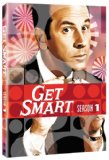| Reviews & Columns |
|
Reviews DVD TV on DVD Blu-ray 4K UHD International DVDs In Theaters Reviews by Studio Video Games Features Collector Series DVDs Easter Egg Database Interviews DVD Talk Radio Feature Articles Columns Anime Talk DVD Savant Horror DVDs The M.O.D. Squad Art House HD Talk Silent DVD
|
DVD Talk Forum |
|
|
| Resources |
|
DVD Price Search Customer Service #'s RCE Info Links |
|
Columns
|
|
|
Get Smart - Season 1
With three of DVDTalk's best reviewers already having taken a crack at the first season of Get Smart, what can I possibly add to the discussion (in regards to getting my review out first: missed it by THAT much)? As well, I'm sure each and every true Get Smart fan has already long-ago bought the show, either in its deluxe full series set offered by Time-Life last year, or this first season set released by HBO over a month ago. So who needs to read what I have to say about it? Then again, the pressure's off, and I can just relax and write whatever comes to mind. Although someone might rightly say to me, "Your review is totally superfluous; you're risking repeating everyone else," I'd reply, "...and LOVING it."
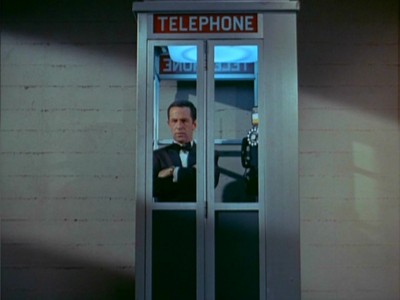
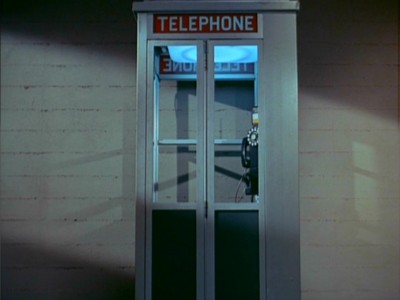
1965. Bond mania is literally sweeping the world in a saturation marketing frenzy that would not be equaled in the global pop culture until George Lucas' Star Wars in 1977. The release of the third Bond film, Goldfinger, in December of 1964, had broken world box office records, and the upcoming December, 1965 release of the fourth in the series, Thunderball - still the single biggest grosser in the series (adjusted for inflation) - was driving Bond fanatics insane with anticipation. In that summer of 1965, the Bond producers re-released double features of the two earlier Bond films, creating even more hype for the upcoming Thunderball. James Bond would never be any bigger as a pop culture icon than at that moment in history.
And of course, that kind of mass adulation for anything brings out the smart-asses of the world who see a bloated target ripe for pricking. Which brings us to prickers Mel Brooks and Buck Henry. Brooks, a former Borscht Belt tummler, writer for Sid Caesar's Your Show of Shows, and creator of the Academy Award-winning short subject, The Critic, teamed up with Henry, an Ivy-League satirist, hoaxster (for several years he claimed to G. Clifford Prout, the president of the Society for Indecency to Naked Animals), and writer and performer on such shows as The New Steve Allen Show and the American version That Was the Week That Was, to create NBC's Get Smart, a spoof of the Bond films - as well as a direct jab at NBC's increasingly popular (and somewhat spoofy) The Man From U.N.C.L.E., which had premiered the previous year. Tom Poston (Newhart) was originally sought to play secret agent Maxwell Smart, but stand-up comedian Don Adams, who had made an impression with NBC executives as the confused hotel detective Byron Glick in The Bill Dana Show, was already under contract with NBC and was slotted into the role.
The premise of Get Smart was surprisingly simple (considering the many permutations the show could have taken with spy spoof genre). Adams played Agent 86, Maxwell Smart, the fumbling, bumbling, mentally-challenged spy for CONTROL, an ultra-secret U.S. spy organization. Despite Smart's general incompetence in almost all endeavors (including the most prosaic, like opening a door correctly or walking across a room), he still managed to be the top agent for the organization, and the one that was always called on by the Chief for particularly dangerous assignments. The Chief (Edward Platt), appeared to be on the brink of a perpetual nervous breakdown because of Smart's ineptitude, but that didn't stop him from re-assigning Smart time and time again - who, despite his bumblings, would somehow manage to get the job done. Aiding Smart in his assignments was Agent 99 (Barbara Feldon), a sweet, tall, sexy secret agent who loved Smart (although he continually rejected her advances), and who futilely tried to keep Smart on track during their dangerous missions - many of them aimed against CONTROL's arch enemy, KAOS, a criminal spy organization which sported equally incompetent spies.
I've written many times before about 1960s TV's penchant - particularly its sitcoms - for keeping elements of a show status quo for the duration of a particular series' run. "Change" was anathema to network executives who wanted to provide a repeatable experience week in and week out for viewers who wanted simple entertainment. "Shaking up" an audience was about the last thing a network wanted when comfort was the name of the game in the mid-60s TV land. As a result, some of those shows seen today can seem repetitive and rote, particularly over the course of their multiple season runs (Hogan's Heroes would probably be the litmus test for this theory). And with entire seasons and series of these old shows coming out on DVD, the experience of watching episodes one after the other, like popping peanuts into your mouth, can accentuate that déjà vu feeling even more. More than less shows from that time period suffer from this kind of "viewer overexposure," a phenomenon newly minted by the DVD format.
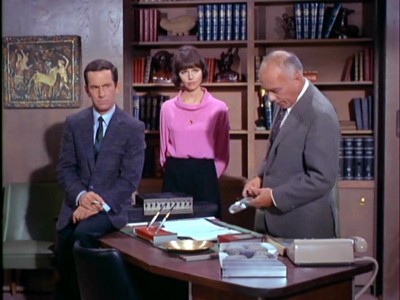
That being said, Get Smart is repetitive - but not anymore so than a lot of other series from that era. Not having seen the series since it aired on Nick at Nite (probably ten years ago or so?), I was anxious to check it out on disc because my childhood memories of the show were so strong. And after the first couple of episodes went down, and the initial "newness" wore off, I started to feel, not unlike other viewers, that the show was repeating itself, perhaps excessively. However, taking a cue from my younger kids (who were dying, laughing at the silliness of Maxwell Smart's world), I held off watching the show in multiple-episode batches (which is about the only way for reviewers, with a ton of titles to get through, can stay on schedule). They seemed to love the show, but they got bored with it quickly (just like anything else) and wanted to move on. Yet in a couple of days, when I put it back on, they were as game as ever to watch it. Problem solved. Get Smart is hilarious - as long as you give it some breathing room inbetween.
It doesn't hurt to watch Get Smart with a bunch of kids, either, because they seem zeroed-in on the show's innate appeal: its child-like antics of Maxwell Smart. Of course, the jokes themselves are intended for adults (I love it in Weekend Vampire, where Smart, after inquiring about buying the haunted mansion, and being told about the many horrors associated with it, asks one last question: "Is it near a school?"), with most of them, I'm sure, flying right over the heads of the younger viewers. So why is that they like the series so much? Certainly the slapstick gags in Get Smart catch their attention; it's not hard to get a kid to laugh at the absolutely brilliant sight gag in Stakeout on Blue Mist Mountain where Max and the Chief run at break-neck speed through the cabin at opposite ends...causing the KAOS agents to shoot themselves. And the repetition of these same kinds of gags (the various agents, like Victor French's hilarious, bitching, complaining Agent 44, stashed away in all kinds of lockers and small enclosures, the physical pratfalls, the development of Smart's catchphrases) only add to the pleasure young viewers find in the series; repetition is everything to young kids. The anticipation of seeing a joke played out that they already know, is half the fun of Get Smart.
But it's more than just funny physical gags; Maxwell Smart is a child in almost every respect. He's one of the few adult characters on a TV sitcom that children can actually feel superior to - even kids who don't know their way around the adult world yet couldn't possibly screw up as badly as Maxwell Smart does on a weekly basis. When Max gets yelled at by his "father" the Chief for doing something incredibly stupid, every kid can understand that situation. Indeed, Smart is often like a kid totally lost in a grown-up world - only this grown-up world is as backward as Smart is. His enemies at KAOS are just as incompetent as CONTROL, and his "parent," the Chief, isn't at all as savvy as most parents are to their own child's failings (the best "unspoken" gag in the whole series is straight-faced Edward Platt maintaining absolute sincerity when re-assigning Max to missions, week after week, when we know Max is totally incompetent). Max's childish insistence on having things his way (his petulant demand to engage "The Cone of Silence" when it obviously doesn't work, is priceless no matter how many times the series uses it) is immediately recognizable to any child. Even the actor himself, Don Adams, with his slight, smallish stature, carefully-cut, close-fitting suits, and conservatively-styled, closely-cropped little-boy haircut, looks like a child at times in medium and long shots (especially next to the statuesque Feldon). The world of Get Smart is a child's world, filled with fantastical, improbable rules and regulations, presided over by a petulant, indulged, incompetent - and oblivious - little boy (what further proof does one need that Max is a typical five-year-old boy than his insistence on utterly ignoring the sexual advances of beauty Feldon?).
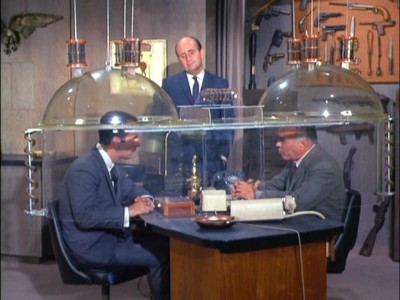
As for adult viewers, they can enjoy Get Smart for its playful spoofing of the spy genre, although to be fair, the writers of the show didn't have all that far to go in sending up that particular genre. There were quite a few literary critics who thought Ian Fleming's original James Bond novels were send-ups to begin with, barely concealed parodies of more lurid pulp fiction like the Mickey Spillane Mike Hammer novels. And by the time Goldfinger came out, with its own hero, James Bond, incredulously replying in the film, "You're joking!" to Q's assertion that his Aston Martin has an ejector seat, the Bond films were already operating as pure fantasy burlesques of the more traditional espionage films. TV had already gotten in on the spy lampoon act, as well, with The Man From U.N.C.L.E. send-up, ironically on NBC.
So Get Smart wasn't first, nor did it depend exclusively on satirizing the spy genre to get laughs. Indeed, watching Get Smart again after all these years, I was struck much more by the "suburban sitcom" elements of the show which flew over my head as a kid (when Max's spy gear like his totally cool/utterly hilarious shoe phone cornered my attention). All of the gags aimed at the working Joes out in the audience - spies bitching about coffee breaks and accumulated vacation time, about punching in at CONTROL's time clock, about the cost of supplies like secret agent paper and ink, about the crummy working conditions, especially for Agent 44 - are far funnier (and timeless) than the gags aimed specifically at the spy genre (and therefore, limited by their 1965 context). A viewer not versed in the codes of spy movie semiology might not get the relevance of a character like "The Craw," but who doesn't ruefully understand the Chief's indignant outrage when he sees how much vacation time his opposite number gets? Indeed, as the series wore on, it became even more suburban sitcom, Bewitched-like, with Max and 99 getting married, having kids, while the Chief acted like Larry Tate (there's even a dog here - a 60s sitcom necessity - in the form of Fang, the cowardly canine CONTROL agent). Max's surreal world of bumbling spies and ridiculous, outsized gags was really no different than Samantha's universe of eccentric witches and "popping" in and out gags.
Scripts and format considerations aside, not enough can be said about the performers Don Adams, Barbara Feldon and Edward Platt. With a show like Get Smart, chemistry between actors is everything. If one element of that trio was out of whack, the whole exercise would fall like a soufflé in a cannon factory. Watching Adams again here, I was amazed at how restrained he was in the face of almost certain "mugging desire." So much of the broad Get Smart would seem to invite a lesser performer right into the arms overkill, but Adams plays it straight for the most part - and he's far funnier for that shrewd effort. Even with that high-pitched nasal twang (said to be based in part on William Powell), Adams goes for deadpan more than the balcony, and he's hilarious. Feldon, on the other hand, is quite loosey goosey, with a flirtatious, almost kooky energy to her scenes - an energy that contrasts powerfully with that throaty, sultry voice of hers. Not coming off at all like her counterparts Cathy Gale or Emma Peel over on The Avengers, she has a sweet, All-American girl quality to her, married to a innately funny demeanor, that's a dynamite combination. She's a real "re-discovery" here, and it's a shame she couldn't find something post-Get Smart to match her unique appeal. And of course Edward Platt does inspired work as the straight man of the piece, playing it for real in every scene, never suggesting he might "corpse" (something that Feldon often does openly - and charmingly). In Max's childlike world, the seriously frustrated Chief is absolutely necessary to ground the comedy, and Platt is expert at being funny while resolutely not trying to be funny. A special mention must go out to Dick Gautier as Hymie the robot, first introduced this season in the Back to the Old Drawing Board episode. Gautier has the impossible task of trying to take a character that can not show emotion of any kind, and make him funny - which he does effortlessly. When Don Adams comes up to Hymie, offering his hand and saying, "Shake!" and Gautier starts to spasm like he's having a seizure, it may be the funniest moment in the entire first season.
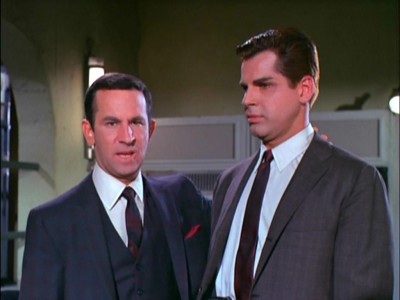
Here are the 30, one-half hour episodes of the four-disc set Get Smart - Season 1:
DISC ONE
Mr. Big (Pilot Episode) (September 18, 1965)
Maxwell Smart is introduced to America. His first mission? To defeat Mr. Big, who plans on using his "Inthermo Ray" to knock down the Statue of Liberty. New partner Agent 99 and Fang the wonder dog/spy help out.
Diplomat's Daughter (September 25, 1965)
Smart must defeat "The Claw" (or "The Craw" as he calls himself) when a diplomat's gorgeous blonde daughter is threatened.
School Days (October 2, 1965)
There's a double agent at the local CONTROL spy school, and it's up to Max and 99 to find him.
Our Man in Toyland (October 9, 1965)
A toy department in a big store is the setting for Max's and 99's efforts to stop KAOS from smuggling secrets out of the country...in Polly Dolly dolls.
Now You See Him, Now You Don't (October 16, 1965)
Does KAOS really have an invisibility ray? It's up to Max to find out.
Washington 4, Indians 5 (October 23, 1965)
Indians are on the warpath again as they threaten the U.S. with a nuclear strike if their lands aren't given back. Would you believe it's a giant arrow?
KAOS in Control (October 30, 1965)
A retrogressor gun - capable of making a person believe they're a child again - threatens the scientists as a CONTROL conference.
The Day Smart Turned Chicken (November 6, 1965)
KAOS wants everyone to think Smart has lost his marbles, so no one will believe him when he has to testify at an important trail.
DISC TWO
Satan Place (November 13, 1965)
The Chief has been kidnapped by KAOS, and it's up to Max, disguised as a surgeon, to get him out of the deep freeze.
Our Man in Leotards (November 20, 1965)
An ultra-secret CONTROL drug has been stolen, and Max must retrieve it.
Too Many Chiefs (November 27, 1965)
A master of disguise has taken on the Chief's countenance to sabotage Max's plans to get KAOS's secret coding system.
My Nephew the Spy (December 4, 1965)
Max must put on a nice face for his visiting aunt and uncle...as KAOS tries to kill him.
Aboard the Orient Express (December 11, 1965)
Who is behind the recent spate of CONTROL agent killings aboard the Orient Express? It's up to Max and 99 to stop the body count.
Weekend Vampire (December 18, 1965)
Is there a vampire loose in CONTROL?
Survival of the Fattest (December 25, 1965)
An Arab prince who is paid a yearly allowance in gold equal to his weight, is under the protection of Max.
Double Agent (January 8, 1966)
Max plays The Spy Who Came In From the Cold to ferret out KAOS.
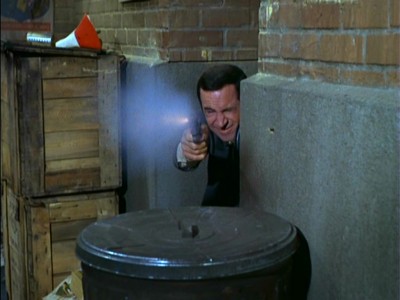
DISC THREE
Kisses for KAOS (January 15, 1966)
Max and 99 must track down an evil artist who's paintings are explosive statements of modern art.
The Dead Spy Scrawls (January 22, 1966)
A pool hall hides a KAOS communications center, and "Minnesota Skinny" Max has to hustle up the clues to find it.
Back to the Old Drawing Board (January 29, 1966)
Max meets Hymie, a deadly KAOS robot who is bent on kidnapping a brilliant scientist.
All in the Mind (February 5, 1965)
Max must pose as a loony colonel to expose a KAOS psychiatrist.
Dear Diary (February 12, 1966)
Max ventures to Spy City, a retirement home for spies, to track down a valuable missing diary.
Smart, the Assassin (February 19, 1965)
Max is hypnotized by KAOS to become a deadly assassin.
I'm Only Human (February 26, 1966)
It's up to Max to rehabilitate Fang, after he's been let go by the Chief.
DISC FOUR
Stakeout on Blue Mist Mountain (March 5, 1966)
A KAOS bomb, brought into Washington by little pieces, must be diffused by Max.
The Amazing Harry Hoo (March 12, 1966)
The Craw is back, and Max must foil his evil laundry/smuggling operation.
Hubert's Unfinished Symphony (March 19, 1966)
The key to a KAOS killer is to be found at the concert - and Max and the Chief have their tickets ready.
Ship of Spies (Part 1) (April 2, 1966)
Max goes overseas in search of a new superweapon. But a clip-clopping killer is right on his trail
Ship of Spies (Part 2) (April 9, 1966)
Max wraps up the shipboard case.
Shipment to Beirut (April 23, 1966)
Max needs the help of a fashion model to track down some top secret plans.
The Last One in is a Rotten Spy (May 7, 1966)
Max is called up to help a member of the Russian swim team.
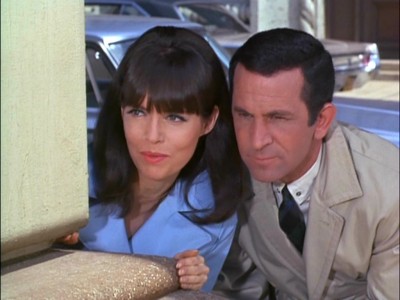
The DVD:
The Video:
The full screen, 1.33:1 video transfer for Get Smart - Season 1 looks reasonably good, with most of the episodes having a bright, color-saturated look to the prints used, as well as little or no compression issues (a tiny bit of edge enhancement on a big monitor). Some episodes do, however, look a little worse for wear, with a tendency to go a little pink. Screen anomalies are present, with some grain, as well, but nothing too distracting, and the picture is sharpish. Overall, quite nice.
The Audio:
The English 2.0 audio track is just the original big, fat mono, split between two channels. All dialogue is clearly heard, with a crisp sound to the music cues. Close-captioning is available.
The Extras:
My understanding is that in the Time-Life release of the entire series, the first season had an extra disc worth of bonuses. Those are gone here, but we do have Barbara Feldon doing an audio intro for each episode (she still sounds sexy as hell), while the three audio commentary tracks remain: Mel Brooks and Buck Henry each talk over Mr. Big, while Feldon talks during Kisses for KAOS. I much preferred Feldon's track (she has a real fondness for Adams), although Henry's does have some good background info on the series. There's also a brief pamphlet included, with a basic background on the series, written by Rory Mach.
Final Thoughts:
Sorry about that, Chief. Watching all of the Get Smart - Season 1 episodes in one lump bunch became a bit of a strain...until I learned to stop worrying and love the series all over again. Given room to breathe, the 30 episodes of this first season of the Mel Brooks/Buck Henry spy spoof are quite amusing, with expert farceurs Don Adams, Barbara Feldon and Edward Platt achieving a level of chemistry together that's impressive for the first season of a series. As much a suburban sitcom as it is a Cold War spy spoof, Get Smart - Season 1 presents an hysterically funny, surreal world of bumbling spies and incompetent super-villains, bent on destroying the world...if they can only quit tripping over their own feet. Don Adams' Maxwell Smart is a petulant, needy child, totally incapable of functioning in the real world, which is lucky, because this ain't that. I highly recommend Get Smart - Season 1.
Paul Mavis is an internationally published film and television historian, a member of the Online Film Critics Society, and the author of The Espionage Filmography.


|
| Popular Reviews |
| Sponsored Links |
|
|
| Sponsored Links |
|
|
| Release List | Reviews | Shop | Newsletter | Forum | DVD Giveaways | Blu-Ray | Advertise |
|
Copyright 2024 DVDTalk.com All Rights Reserved. Legal Info, Privacy Policy, Terms of Use,
Manage Preferences,
Your Privacy Choices | |||||||









